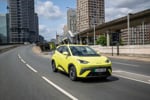Conference delegates were told that moving beyond the 2005 Euro IV emission standards would mean 'social changes' such as restricting the use of cars or commercial vehicles.
Dr Paul Nieuwenhuis, from the Centre for Automotive Industry Research at Cardiff University, described the motor car as the most regulated consumer product, with much of the regulation concerning its environmental impact.
He added: '2005 Euro IV standards approach what is technically feasible with existing technology. Moving beyond this requires social changes, such as restricting car or commercial vehicle use, and more radical new powertrain technologies. This would require a change in policy direction.'
The main policy driver concerning vehicles among politicians in Brussels and London, he said, was carbon dioxide emissions.
Nieuwenhuis said the car sector was responding to environmental concerns and the European Automobile Manufacturers' Association (ACEA) had an agreement with the European Commission to work towards achieving a 140g/km new car fleet average by 2008 and an average of 120g/km by 2010.
Fleets were told they could easily reduce CO2 emissions by improving fuel consumption, using non-carbon or lower-carbon alternative fuels, using carbon-neutral schemes and reducing the total miles driven.
Nieuwenhuis said a century ago the car was seen by many as a cleaner alternative to the horse. This was because in London alone 5,000 tonnes of horse manure had to be removed each day.
By the 1930s, Southern California had the highest level of car ownership in the world but it was also the first to meet certain problems associated with the car.














Login to comment
Comments
No comments have been made yet.